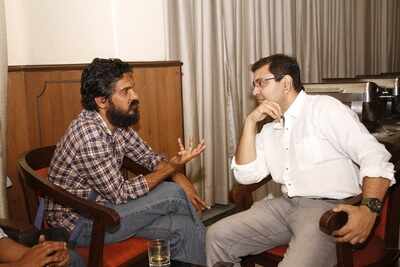- News
- entertainment
- bengali
- movies
- I don’t want to release Death of Insane in theatres: Sanal Kumar Sasidharan
Trending
This story is from February 27, 2019
I don’t want to release Death of Insane in theatres: Sanal Kumar Sasidharan

One has courted controversy by making S Durga and the other is still navigating his way through the mainstream filmmaking in Bengal. At a party, Sanal Kumar Sasidharan met Indrasis Acharya when the S Durga director was in Kolkata to attend CineMagic, a film festival at the Satyajit Ray Film and Television Institute. Team CT was witness to the duo’s adda over independent cinema, censorship and success. Excerpts...
Excerpts...
Indrasis Acharya (IA): Is there any chance of releasing your next titled Death of Insane?
Sanal Kumar Sasidharan (SKS): Actually, it is a kind of a film that I don’t want to release in theatres. It is a personal film. I want people to watch it in their private time, without any kind of hindrance. I don’t want the government and the Central Board of Film Certification to interfere. I don’t want to submit it for certification. Perhaps, you can call it a video film.
IA: Will you send it to festivals? Or will you try to give it to any online streaming website?
IA: Isn’t that striking?
SKS: Yes, that is very sad.
IA: What should we do if festivals are asking for censor certificate? Our intention is to make films that might stir our audience. We want to express our thought process through our films. If somebody cuts it there, what is the point in making films that are different from commercial movies?
SKS: Yes, that is the problem.
IA: Also, don’t you think if the film is not released, producers will not get their money back? How will you get funds to make your next film?
SKS: Fortunately, my producer Shaji (Mathew) stands for good films. He says, ‘If you are satisfied with the film, it is OK. It doesn’t matter whether or not we earn the money back’. We will continue to make films. Someday, some film will make money. That’s the idea. But I really want people to watch Death of Insane. It is not the kind of film you can watch in theatres. It is a political film and I don’t want any kind of censorship in this. There are a lot of people who love to watch such films. If we can connect, we can simply send it to their inbox. We are good if we have 10 centres in the country where we have that kind of crowd who would appreciate good films.
IA: Yes. The audience might grow exponentially after that. I face a similar problem here. I can’t often make films that I believe in. I will not get producers. I end up making something in-between. I think the perception of cinema will change only if we make such movies. Films that are considered to be good here are full of emotions.
SKS: Forget commercial films, even in festival circuit, emotion plays a big role (laughs). And I agree with your feelings. I also think that cinema is not a medium for storytelling. It is something else. As a director, you have to evolve. You have to experiment. You will not be able to evolve if you are totally dependent on the mass or even if you are totally dependent on the festival curators.
IA: Yes. That’s because everyone will have his or her own perception.
SKS: Yes, one way or the other, they will limit you. A filmmaker will have his or her own perspective. We need to have our own collectives — maybe a bunch of filmmakers or a group of film buffs who want to watch such films. We need to escape the idea of storytelling.
IA: Yes, it is a tough job.
SKS: But, it is not impossible. For example, I see a lot of Facebook groups talking about very interesting films. Those people are there. They are very passionate about it. They discuss (Michael) Haneke’s films and so on.
IA: Here, many are still grappling with the idea of the language of films. Think about the frames Haneke uses. The off-framing where there is no character in the frame. Maybe, I don’t want to show any character in my film. I think that’s the way to do it.
SKS: I think, there is an audience for such films. Actually, we need to find this group. Maybe, that’s just ten thousand viewers all around India. That’s fine. That number is sufficient to support us. That number can eventually grow if nurtured. That is a tough job. That should be our objective — to bring all the independent filmmakers together and host festivals wherever we can. Then there will be some kind of energy.
IA: Yes, and through this, we might want to chalk out a sustainable business model so that we can also make money. The way you have set up your team…
SKS: Everywhere filmmakers are trying to set up something for their creativity. You have also made your own film. You are trying to gather finance for your film. And you are successful. I have watched your film and that means you are successful.
IA: Depends on how you define success…
SKS: Success lies in making a film that is appreciated by someone who has no idea of who you are. I had no idea who you were when I watched your film. I was looking for a film from Bengal that might fit into our festival. Before that, I had no idea what kind of films you have been making. And then, we met and discussed.
IA: Yes, there should be this neutrality factor. That is somehow missing these days even from the festival circuit.
SKS: Actually, a film is a platform for the audience. They will come, watch and discuss. It is not necessary that they discuss the film only…
IA: Yes and we only want to increase the number of the audience. There is nothing wrong with what our audience usually watches. But I would request viewers to watch other kinds of films too.
SKS: People are often unaware of the kind of films that we are making. They watch mainstream films. Why? That’s because mainstream films have that infrastructure. We don’t usually have that kind of infrastructure. No advertisements. No promotions. Nothing. Even after that, we are holding this conversation.
IA: Yes. That is amazing. And we have a common objective of creating a platform of our own.
SKS: In fact, you are shooting your film now and yet, you have found time to come and meet me. That is great.
IA: Yes. Absolutely (laughs).
SKS: This is only because of the films we make. We love films.

Indrasis Acharya (IA): Is there any chance of releasing your next titled Death of Insane?
Sanal Kumar Sasidharan (SKS): Actually, it is a kind of a film that I don’t want to release in theatres. It is a personal film. I want people to watch it in their private time, without any kind of hindrance. I don’t want the government and the Central Board of Film Certification to interfere. I don’t want to submit it for certification. Perhaps, you can call it a video film.
IA: Will you send it to festivals? Or will you try to give it to any online streaming website?
SKS: Well, I tried to send it to festivals. But festivals are more or less trying to limit the entry to films that are censored.
IA: Isn’t that striking?
SKS: Yes, that is very sad.
IA: What should we do if festivals are asking for censor certificate? Our intention is to make films that might stir our audience. We want to express our thought process through our films. If somebody cuts it there, what is the point in making films that are different from commercial movies?
SKS: Yes, that is the problem.
IA: Also, don’t you think if the film is not released, producers will not get their money back? How will you get funds to make your next film?
SKS: Fortunately, my producer Shaji (Mathew) stands for good films. He says, ‘If you are satisfied with the film, it is OK. It doesn’t matter whether or not we earn the money back’. We will continue to make films. Someday, some film will make money. That’s the idea. But I really want people to watch Death of Insane. It is not the kind of film you can watch in theatres. It is a political film and I don’t want any kind of censorship in this. There are a lot of people who love to watch such films. If we can connect, we can simply send it to their inbox. We are good if we have 10 centres in the country where we have that kind of crowd who would appreciate good films.
IA: Yes. The audience might grow exponentially after that. I face a similar problem here. I can’t often make films that I believe in. I will not get producers. I end up making something in-between. I think the perception of cinema will change only if we make such movies. Films that are considered to be good here are full of emotions.
SKS: Forget commercial films, even in festival circuit, emotion plays a big role (laughs). And I agree with your feelings. I also think that cinema is not a medium for storytelling. It is something else. As a director, you have to evolve. You have to experiment. You will not be able to evolve if you are totally dependent on the mass or even if you are totally dependent on the festival curators.
IA: Yes. That’s because everyone will have his or her own perception.
SKS: Yes, one way or the other, they will limit you. A filmmaker will have his or her own perspective. We need to have our own collectives — maybe a bunch of filmmakers or a group of film buffs who want to watch such films. We need to escape the idea of storytelling.
IA: Yes, it is a tough job.
SKS: But, it is not impossible. For example, I see a lot of Facebook groups talking about very interesting films. Those people are there. They are very passionate about it. They discuss (Michael) Haneke’s films and so on.
IA: Here, many are still grappling with the idea of the language of films. Think about the frames Haneke uses. The off-framing where there is no character in the frame. Maybe, I don’t want to show any character in my film. I think that’s the way to do it.
SKS: I think, there is an audience for such films. Actually, we need to find this group. Maybe, that’s just ten thousand viewers all around India. That’s fine. That number is sufficient to support us. That number can eventually grow if nurtured. That is a tough job. That should be our objective — to bring all the independent filmmakers together and host festivals wherever we can. Then there will be some kind of energy.
IA: Yes, and through this, we might want to chalk out a sustainable business model so that we can also make money. The way you have set up your team…
SKS: Everywhere filmmakers are trying to set up something for their creativity. You have also made your own film. You are trying to gather finance for your film. And you are successful. I have watched your film and that means you are successful.
IA: Depends on how you define success…
SKS: Success lies in making a film that is appreciated by someone who has no idea of who you are. I had no idea who you were when I watched your film. I was looking for a film from Bengal that might fit into our festival. Before that, I had no idea what kind of films you have been making. And then, we met and discussed.
IA: Yes, there should be this neutrality factor. That is somehow missing these days even from the festival circuit.
SKS: Actually, a film is a platform for the audience. They will come, watch and discuss. It is not necessary that they discuss the film only…
IA: Yes and we only want to increase the number of the audience. There is nothing wrong with what our audience usually watches. But I would request viewers to watch other kinds of films too.
SKS: People are often unaware of the kind of films that we are making. They watch mainstream films. Why? That’s because mainstream films have that infrastructure. We don’t usually have that kind of infrastructure. No advertisements. No promotions. Nothing. Even after that, we are holding this conversation.
IA: Yes. That is amazing. And we have a common objective of creating a platform of our own.
SKS: In fact, you are shooting your film now and yet, you have found time to come and meet me. That is great.
IA: Yes. Absolutely (laughs).
SKS: This is only because of the films we make. We love films.
End of Article
FOLLOW US ON SOCIAL MEDIA







